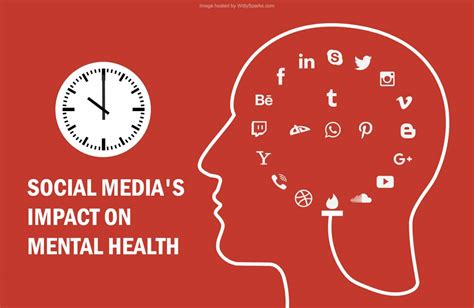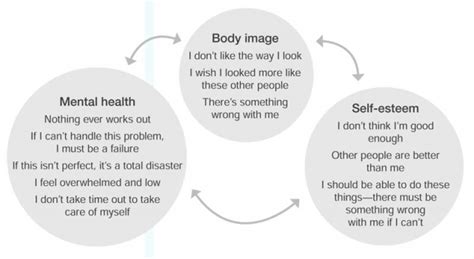Over the past few decades, modern society has witnessed the emergence of a digital era that has transformed the way people connect and communicate. With the proliferation of internet-based platforms, individuals have been given the unprecedented opportunity to share their thoughts, experiences, and emotions with a global audience. These virtual spaces, often referred to as social networking sites, play a significant role in shaping interpersonal relationships and facilitating social interactions. However, it is essential to critically examine the repercussions that prolonged engagement with these platforms may have on one's psychological well-being.
An increasing body of evidence suggests that the incessant use of online platforms can profoundly affect individuals' mental state. While these digital environments offer a sense of belonging, self-expression, and connectedness, excessive exposure can give rise to a range of mental health issues. The incessant quest for validation, as individuals seek approval through "likes" and comments, often fuels feelings of inadequacy, self-doubt, and anxiety. Moreover, the curated presentation of idealized lifestyles on social media platforms can lead to unhealthy social comparisons, further exacerbating negative feelings and damaging self-esteem.
Furthermore, the constant stream of information and stimuli bombarding social media users can impede cognitive processes and contribute to attention deficit disorders. The rapid-fire nature of these platforms, with their clickable headlines, short attention-span content, and scrollable newsfeeds, has trained the brain to consume information in bite-sized snippets. Consequently, individuals find it increasingly challenging to engage in deep, reflective thinking or sustain prolonged concentration. This constant cognitive overload not only hampers intellectual growth but also has a detrimental impact on mental well-being.
The Impact of Popular Networking Platforms on Psychological Well-being

In today's digitally-connected world, where virtual interactions have become increasingly prevalent, it is imperative to explore the consequences of popular networking platforms on our psychological well-being. These widely-used online networks have the potential to significantly influence our mental state and overall emotional health.
Engaging with these platforms can have both positive and negative effects on individuals. On one hand, they provide a sense of belonging and connection, enabling users to expand their social networks and interact with a diverse range of individuals. However, on the other hand, excessive usage and constant exposure to curated lives and comparisons with others may inadvertently contribute to feelings of loneliness, anxiety, and insecurity.
With the advent of social media, the definition of self-worth has undergone a significant shift. Users may feel pressured to present an idealized version of themselves, perpetuating a cycle of self-comparison and self-doubt. The frequency of these comparisons can lead to detrimental effects on mental health, such as decreased self-esteem and increased symptoms of depression and anxiety.
Additionally, the presence of cyberbullying and online harassment cannot be ignored. These negative experiences, often triggered and amplified by social media platforms, can have severe consequences on an individual's mental well-being, leading to feelings of distress, inadequacy, and even suicidal thoughts.
It is crucial to address these issues surrounding popular networking platforms and their impact on mental health. By raising awareness, promoting digital literacy, and fostering open discussions, we can work towards creating a healthier online environment that supports psychological well-being and encourages positive interactions.
Rise in Anxiety and Depression Rates
In recent years, there has been a noticeable surge in the prevalence of anxiety and depression among individuals, with social media platforms playing a substantial role in exacerbating these mental health conditions. As technology advances, the way society interacts and communicates has significantly transformed, giving rise to a myriad of profound psychological impacts, particularly on anxiety and depression rates.
Social media has become an integral part of our daily lives, with its widespread use fostering an environment that amplifies feelings of anxiousness and sadness. The constant exposure to carefully curated portrayals of other people's lives on social media platforms, such as Instagram and Facebook, can lead individuals to compare themselves and their accomplishments, generating feelings of inadequacy and low self-esteem.
Moreover, the pursuit of validation and "likes" on social media has shifted the focus towards external validation rather than fostering true internal happiness. The constant need for approval and positive feedback can result in heightened anxiety levels, as any absence or decline in social media engagement can be interpreted as a personal rejection.
Another aspect to consider is the potential for cyberbullying, which has become alarmingly prevalent on social media platforms. The anonymity provided by online platforms allows individuals to engage in cyberbullying behavior, causing immense emotional distress for the victims. The constant exposure to negativity and harmful comments can lead to a deterioration in mental health, further contributing to the rise in anxiety and depression rates among users.
It is crucial to acknowledge that social media can also provide a supportive network for individuals struggling with anxiety and depression. The ability to connect with others who share similar experiences can be empowering and provide a sense of community. However, it is essential to strike a balance and be mindful of the potential negative impacts that excessive use or certain online interactions can have on mental well-being.
In conclusion, the proliferation of social media has coincided with increasing rates of anxiety and depression. The pressure to present an idealized version of oneself, the pursuit of external validation, the prevalence of cyberbullying, and the constant exposure to harmful content all contribute to the significant impact that social media has on mental health. It is crucial for individuals to be aware of these potential issues and take steps to protect their well-being when engaging with social media platforms.
Negative Effects on Self-Esteem and Body Image

Self-perception and body image play a significant role in our overall well-being and emotional state. However, the rise of social media platforms has introduced a new set of challenges that can have detrimental effects on our self-esteem and body image.
1. Unrealistic Beauty Standards: Social media often bombards us with images of supposedly "perfect" bodies and faces, which can create unrealistic expectations of how we should look. This constant exposure to flawless images can lead to feelings of inadequacy and dissatisfaction with our own appearance.
2. Comparison and Envy: Social media platforms encourage comparisons among users, especially when it comes to physical appearance. Constantly seeing others posting edited and filtered photos can trigger feelings of envy and insecurity, as we compare ourselves to the seemingly flawless images presented online.
3. Cyberbullying and Body Shaming: The anonymity provided by social media can embolden individuals to engage in cyberbullying and body shaming. Negative comments about one's appearance can have a profound impact on self-esteem, leading to feelings of shame and self-doubt.
4. Constant Exposure to Filters and Edits: The extensive use of filters and photo editing tools on social media platforms can distort reality and contribute to an unhealthy perception of beauty. Seeing enhanced images regularly can make us believe that flaws are unacceptable and unattractive.
5. "Fitspiration" Culture: The rise of the "fitspiration" movement on social media promotes the idealization of a certain body type, often associated with extreme exercise and dieting. This can lead to the development of unhealthy behaviors and obsessions to attain these unrealistic standards.
6. Shift of Focus to External Validation: With the constant pursuit of "likes" and followers on social media, our self-worth can become increasingly dependent on external validation. This shift in focus can negatively impact our self-esteem and hinder our ability to develop a healthy self-image.
It is crucial to be mindful of the negative influences of social media on self-esteem and body image. Recognizing these effects and promoting body positivity, self-acceptance, and authentic representation can help mitigate the detrimental consequences on our mental well-being.
Cyberbullying and its Psychological Impact
Within the ever-expanding digital landscape, the omnipresence of cyberbullying has become a distressing reality. This section delves into the profound psychological consequences stemming from the malicious acts perpetrated through modern online platforms.
1. Bullying Beyond Borders:
- The global connectivity provided by the internet has intensified the scope and severity of cyberbullying, transcending geographical boundaries.
- Individuals from diverse backgrounds are exposed to a myriad of distressing messages, rumors, and threats that profoundly impact their psychological well-being.
2. Emotional Toll:
- Cyberbullying inflicts severe emotional distress, often leading to heightened levels of anxiety, depression, and low self-esteem.
- The relentless online harassment can undermine an individual's sense of security, leaving them feeling vulnerable and socially isolated.
3. Long-term Consequences:
- The psychological repercussions of cyberbullying can extend far beyond the immediate experience, persisting into adulthood.
- Victims of cyberbullying are at an increased risk of developing long-term mental health issues, including chronic anxiety disorders and suicidal thoughts.
4. Cognitive Challenges:
- Continuous exposure to cyberbullying can impair cognitive functioning, negatively affecting concentration, memory, and overall academic performance.
- The persistent stress resulting from cyberbullying acts as a significant barrier to healthy cognitive development and growth.
5. Coping with Cyberbullying:
- Understanding effective coping mechanisms is crucial in minimizing the psychological impact of cyberbullying.
- Encouraging open communication, building resilience, and providing emotional support are essential strategies for individuals dealing with cyberbullying.
By acknowledging the psychological toll of cyberbullying, we can work towards creating a safer online environment that fosters positive mental well-being for all individuals.
Strategies for Maintaining a Balanced Digital Lifestyle

Living harmoniously in the modern digital age is a delicate balance. With the ubiquitous presence of online platforms and the constant connectivity they provide, it has become imperative to adopt strategies that promote a healthy relationship with technology. By implementing mindful practices and setting boundaries, individuals can navigate the digital landscape while safeguarding their mental well-being.
| Strategy | Description |
|---|---|
| Establishing Digital Detox Periods | Allocate dedicated time slots where technology is restricted, allowing for rejuvenation and disconnection from the digital world. |
| Creating Personalized Screen Time Limits | Set daily or weekly limits on the use of social media and other digital platforms to prevent excessive consumption and promote a healthy balance. |
| Fostering Face-to-Face Interactions | Actively engage in offline activities and prioritize in-person social interactions to counteract the potential isolation and loneliness associated with excessive social media use. |
| Nurturing Digital Boundaries | Establish clear guidelines regarding the sharing of personal information online and manage privacy settings to minimize potential risks and maintain control over your digital presence. |
| Engaging in Mindful Digital Consumption | Cultivate awareness of how digital content affects your well-being, and consciously curate your online experiences by following accounts that inspire and uplift you. |
| Prioritizing Physical and Mental Health | Make time for regular physical exercise, quality sleep, and relaxation techniques to counteract the sedentary and mentally draining aspects of excessive screen time. |
By embracing these strategies, individuals can strike a healthy equilibrium between their digital lives and overall well-being. It is within our power to shape our digital habits and foster a positive relationship with technology, thus promoting a healthier mindset and improving our overall mental resilience.
FAQ
How does social media affect mental health?
Social media can have both positive and negative effects on mental health. On one hand, it provides a platform for social connection, support, and the sharing of experiences. On the other hand, excessive use of social media can lead to feelings of inadequacy, depression, anxiety, and low self-esteem. It can also contribute to addictive behaviors and a decrease in real-life social interactions.
What are some common mental health issues associated with social media?
Some common mental health issues associated with social media include increased feelings of loneliness and isolation, comparison anxiety, fear of missing out (FOMO), cyberbullying, and sleep disturbances. These issues can have a significant impact on one's overall well-being and may require professional help to address.
Are there any positive aspects of social media for mental health?
Yes, social media can have positive effects on mental health. It can provide a sense of belonging, help individuals find support groups, and increase awareness about mental health issues. Social media platforms also offer opportunities for self-expression, creativity, and advocacy, allowing people to share their stories and reduce the stigma surrounding mental health.



